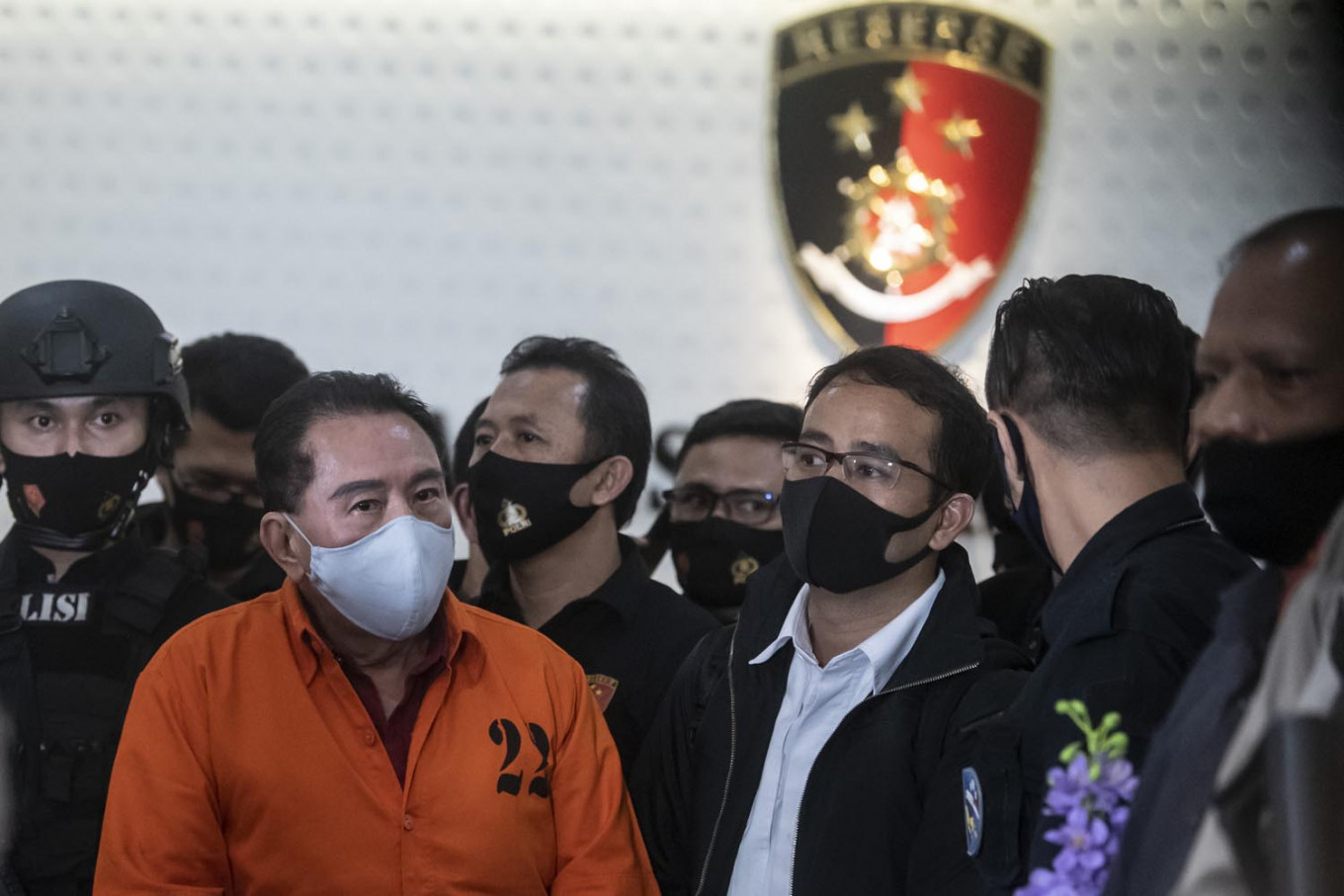Police following money trail in Djoko Tjandra’s flight
Djoko Tjandra allegedly returned to Indonesia more than a decade after escaping to Papua New Guinea with the help of several accomplices, including three police generals.
Change Size

T
he National Police will investigate allegations that a flow of illicit funds allowed graft fugitive Djoko Soegiarto Tjandra to evade law enforcement for more than a decade.
Police arrested Djoko in Malaysia on Thursday in what authorities called “a planned operation”. He had spent 11 years on the run.
After being questioned at the headquarters of the National Police’s Criminal Investigation Agency (Bareskrim), Djoko was detained at a police facility in Salemba, Central Jakarta.
“We will proceed with our investigation related to the issuance of travel recommendation letters and […] the alleged flow of illicit funds [pertaining to his flight],” Bareskrim chief Comr. Gen. Listry Sigit Prabowo said during a televised press briefing on Friday.
Djoko escaped the country to Papua New Guinea in 2009, a day before the Supreme Court sentenced him to two years in prison and ordered him to pay more than Rp 546 billion (US$54 million) in restitution for his role in the Bank Bali corruption case.
He managed to return to Indonesia in early June to file a request for a review for his conviction. He reportedly filed the documents after obtaining a new electronic ID card and passport and having his Interpol red notice status lifted.
Djoko’s clandestine return to Indonesia has implicated three high-ranking police generals, who were removed from top positions in the force for their alleged facilitation of Djoko’s travel within the country.
Bareskrim's Civil Servant Investigator Supervisory and Coordination Bureau head Brig. Gen. Prasetyo Utomo has been named a suspect by the police for allegedly issuing forged travel letters for Djoko.
Indonesian Anti-Corruption Community (MAKI) chairman Boyamin Saiman previously urged authorities to trace the flow of funds in the case, suggesting that there were more cases to be discovered.
“We could look into additional alleged bribery surrounding the case if he were to open up,” Boyamin said during an interview with Kompas TV on Thursday.
Corruption Eradication Commission (KPK) acting spokesperson Ali Fikri said the antigraft body had offered help to the police track the flow of funds in the case. “We have communicated and coordinated with Bareskrim through our deputy [head] of prevention.”
Meanwhile, the Indonesia Corruption Watch (ICW) has demanded that President Joko “Jokowi” Widodo evaluate the performance of Budi Gunawan, the current chair of the National Intelligence Agency (BIN), for his failure to detect Djoko within Indonesia’s borders. The agency has denied any wrongdoing.
ICW activist Kurnia Ramadhana said Budi had failed to detect and apprehend Djoko, a convict in the high-profile Bank Bali corruption case, after he allegedly entered the country undetected to file a request for a review of his conviction on graft charges in early June. Djoko fled to Papua New Guinea in 2009 to escape his conviction.
“The President must immediately evaluate the performance of BIN head Budi Gunawan, because he was proven to have failed to detect graft fugitive Djoko Tjandra, allowing the latter to travel in Indonesia easily,” Kurnia wrote in a statement recently.
Djoko’s furtive return elicited widespread criticism of the Indonesian bureaucracy. Djoko was reportedly able to file the case review request at the South Jakarta District Court, obtain a new electronic identification card and passport and have his Interpol red notice lifted.
Kurnia noted that prior to Budi assuming his current position in 2017, BIN had managed to bring home two graft fugitives from outside the country.
The first was Totok Ari Prabowo, former regent of Temanggung, Central Java, who was convicted of embezzling an educational aid fund. He fled to Cambodia in 2011 and was captured by the BIN in 2015. The second was Samadikun Hartono, who was convicted in a BLBI bailout corruption case. He escaped to China and was captured in 2016.
Kurnia said BIN had the responsibility to apprehend escaped graft convicts as the 2011 State Intelligence Law gave the agency the mandate of pursuing threats to the nation’s economy.
“Therefore, we conclude that the search and circulation of information from BIN has not shown optimal results,” he added.
In response to ICW’s complaints, BIN deputy head of communication and information Wawan Hari Purwanto said the intelligence agency was not a law enforcement body and that its position under the president required it to report directly to him, instead of to the public.
“According to article 30 of Law No. 17/2011 on state intelligence, BIN does not have the authority to carry out arrests either at home or abroad. BIN is not a law enforcement agency, and its [task] is to provide strategic input related to state security to the president,” Wawan said in a statement to The Jakarta Post on Saturday.
He said the agency would continue to coordinate with other domestic and foreign intelligence agencies to hunt down graft fugitives clandestinely, as was the case with the arrests of Totok and Samadikun.
He also mentioned BIN was involved in the recent arrest of fugitive Maria Pauline Lumowa, which was spearheaded by the Law and Human Rights Ministry.









